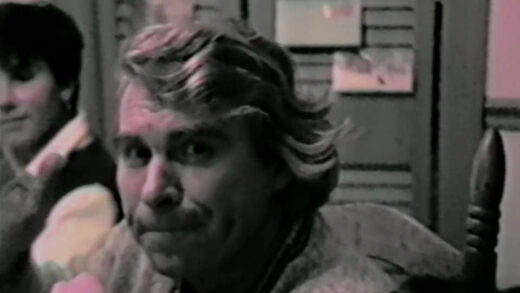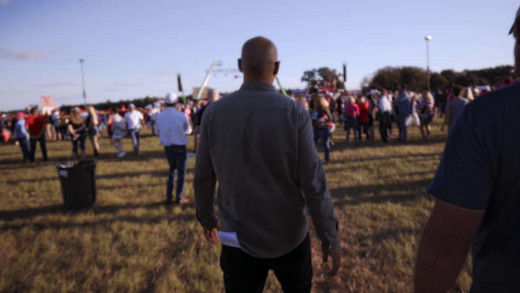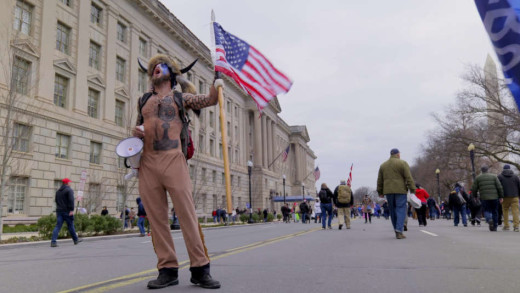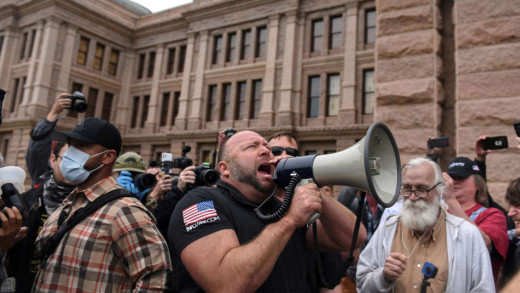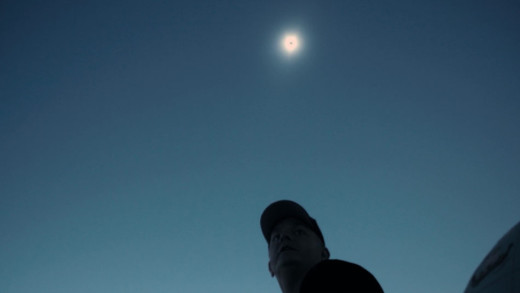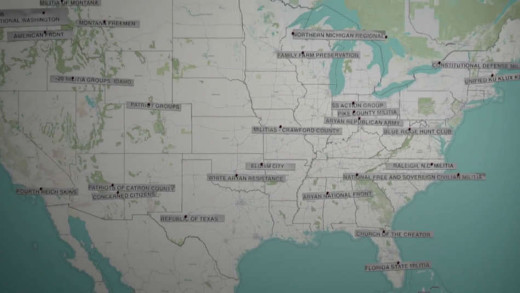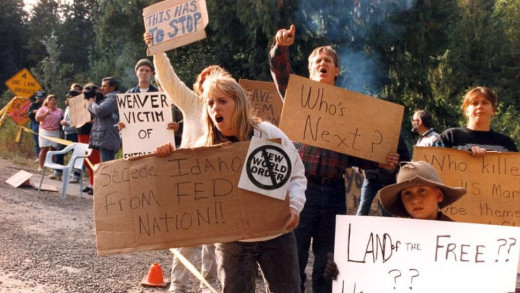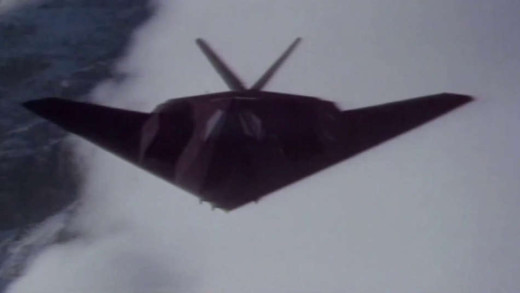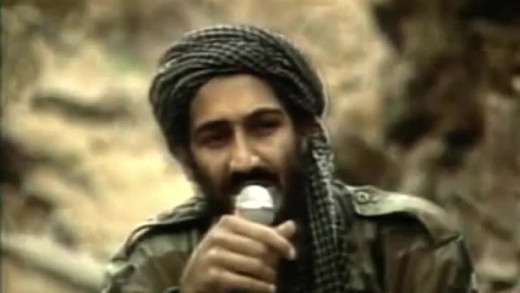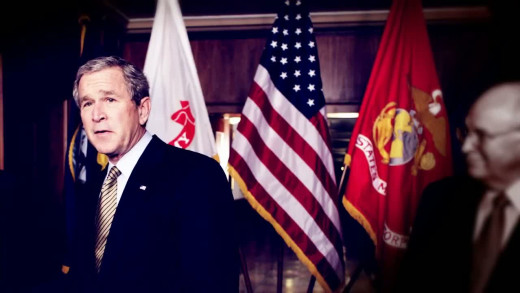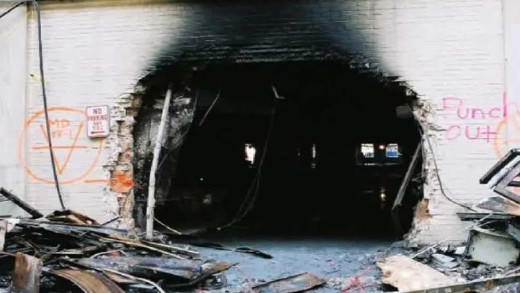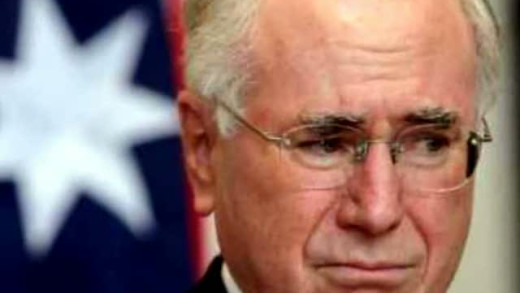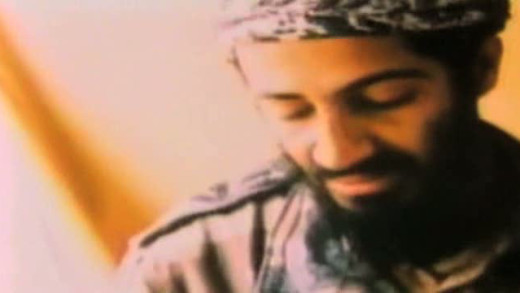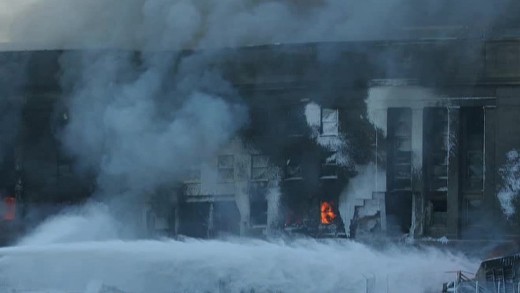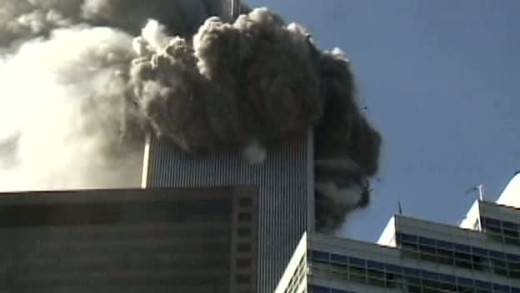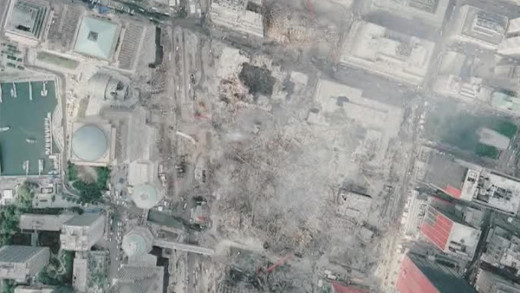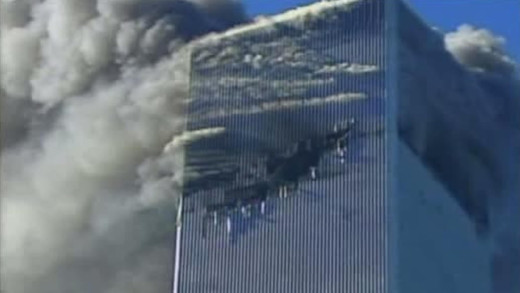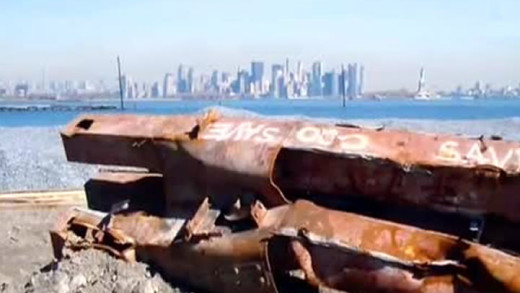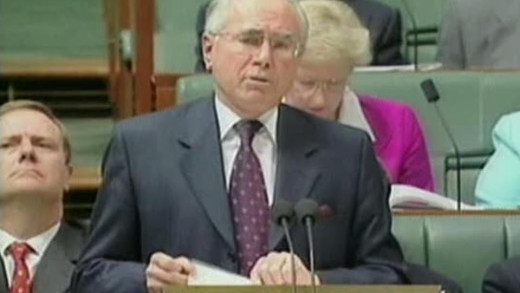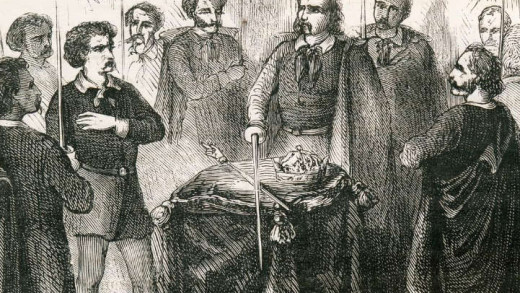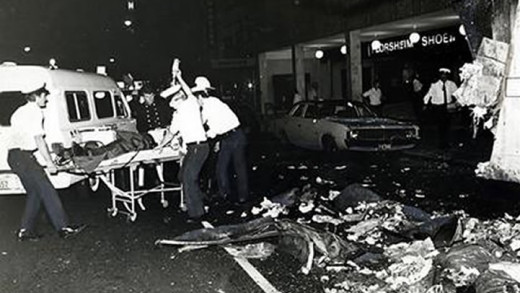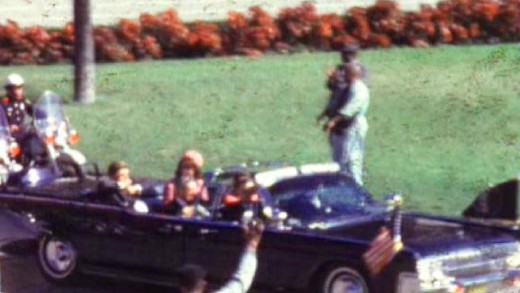Shifty
Shifty is a series of films that traverse the past 40 years in Britain, showing how the shift of political power to finance and hyper-individualism came together in powerful ways, to undermine one of the fundamental structures of mass democracy--the shared idea of what is real. As that fell apart, with it went the language and the ideas that people had turned to for the last 150 years to make sense of the world they lived in. As a result, life in Britain and the current and former colonies of its empire, has become strange--a hazy dream-like flux, where distrust in politicians keeps growing, and the political class seems to have lost control. Through archive footage, news reels, and on-screen-text in video essay format, Shifty documents the shapes of how this happened, using the vast ranges of footage to evoke what if felt like to live through an epic transformation during the 1980s.
A documentary series that explores an investigation led by freelance writer Danny Casolaro on what he called "The Octopus," an elaborate conspiracy network involving the United States government and its covert operations. The series stems from the circumstances around Casolaro eventually being found dead in a hotel room. Researcher Christian Hansen revisits Casolaro's work and questions whether Casolaro actually died by suicide. The series tracks Casolaro investigating the circumstances around Inslaw's PROMIS software, a database system built to to aid law enforcement and legal prosecutors in tracking court cases, which the Department of Justice began using, stopped paying for, and then was later accused of stealing. The Iran-Contra affair also features, and the 1980 'October Surprise', where Ronald Reagan's presidential campaign covertly negotiated with Iran to delay the release of American hostages until after the election to influence its outcome. Through a cast of shady characters, the corporate world, spies, and interesting real and theorised information, The Octopus Murders is a murder mystery wrapped in major 20th-century scandals.
In the United States, a year after Joe Biden's inauguration, around two-thirds of Republican voters believe his election was illegitimate, and the idea that the 2020 election was stolen from Donald Trump is now a defining issue of the Republican Party. Yet the story of how lies about election fraud made their way to the center of American politics has not been fully told. Plot to Overturn the Election traces the hidden sources of misinformation about the 2020 election, demonstrating how a handful of people have had an outsized impact on the current crisis of democratic legitimacy.
Q: Into the Storm is a series that examines the far-right conspiracy theory QAnon that alleges there is a secret cabal of satan-worshipping, cannibalistic paedophiles running a global child sex-trafficking ring and plotting against former United States president Donald Trump. Spanning three years and traversing the globe, the series investigates the movement as it grows in scope and political significance, chronicling its evolution in real time, revealing how “Q” used information warfare to game the internet, hijack politics, and manipulate people's thinking. Filmmaker Cullen Hoback gains unprecedented access to key players in the spectacle, including Jim and Ron Watkins, the father/son team behind the 8chan website that “Q” calls home, and explores their rivalry with Fredrick Brennan, the original creator of the website. The series profiles “Q-tubers,” Q debunkers, political operatives, and journalists who have been closely following the movement since it began in 2017, showing connections between QAnon, President Trump, and political and ex-military operatives, as well as other various right-wing movements associated with 8chan, including "Gamergate" and "Pizzagate" that contextualises QAnon’s influence on culture and politics in the United States.
Can't Get You Out of My Head: An Emotional History of the Modern World is a six-part series that explores how modern society has arrived to the strange place it is today. The series traverses themes of love, power, money, corruption, the ghosts of empire, the history of China, opium and opioids, the strange roots of modern conspiracy theories, and the history of Artificial Intelligence and surveillance. The series deals with the rise of individualism and populism throughout history, and the failures of a wide range of resistance movements throughout time and various countries, pointing to how revolution has been subsumed in various ways by spectacle and culture, because of the way power has been forgotten or given away.
United States of Conspiracy investigates the alliance of far-right radio show host and conspiracy theorist Alex Jones, Donald Trump, and long-time Trump associate Roger Stone, and their roles in deepening the battle over truth and lies in an age of disinformation. Drawing on interviews with Stone, former staffers from Jones' InfoWars website, people who have been directly affected by their conspiracy theories, and experts in how misinformation spreads, we see how once-fringe conspiracy theories have come to be wielded as a pervasive tool at the highest levels of mainstream politics.
Behind the Curve documents the resurgence of believers of a flat Earth, as made popular through YouTube videos. The film is a personal exploration of how people became exposed to flat Earth theories (the YouTube algorithm), and how those ideas were reinforced in an echo chamber of social media, rejecting empirical evidence, at a time of increasing countercultural distrust in authority figures and the epistemology of science. The narrative at the core of the film reveals how the screen bubble can envelop a person's informational exposure, and change their relationships and perceptions in the real world, where confirmation bias is reinforced, making alternative views threatening, and individualism sacrosanct. Information that is contrary to a deeply held belief then becomes increasingly impossible to accept, especially if it has changed your life and circle of friends. So with empathy and a playful warmth, Behind the Curve becomes a warning light to the importance of honest discourse and critical analysis, falsifiability and dogma, but above all, to empathy and understanding of a person's desire to create meaning and acceptance in a lonely, fragmented culture.
On April 19, 1995, Timothy McVeigh, a former soldier deeply influenced by the literature and ideas of the radical right, parked a truck with a five-ton fertiliser bomb in front of the Alfred P. Murrah Federal building in Oklahoma City. Moments later, 168 people were killed and 675 were injured in the blast. Oklahoma City traces the events that led McVeigh to that day from the perspective of the survivors, first-responders, investigators, and journalists who covered the events. The film provides an exploration of the convergence of various conservative religious movements and white supremacist militias that rose to prominence in the early 1990s, and were catalysed by the actions of government during that time.
Shortly before dawn on August 21, 1992, United States Marshals initiated actions to apprehend and arrest Randy Weaver, a former US Army engineer, when he failed to appear in court on firearms charges after being coaxed by undercover agents to sell them sawed-off shotguns after hanging out with nazis and white supremacists. Given three conflicting dates for his court appearance, and suspecting a conspiracy against him, Weaver refused to surrender, and members of his immediate family and family friend Kevin Harris resisted as well, isolating themselves in their mountaintop home in Ruby Ridge, Idaho. When federal agents surveilling the property got close to members of the family, they also initiated a gunfight that mesmerised the nation, leaving Weaver injured, his son killed, and Striker the family dog dead. In the subsequent siege led by the FBI, Weaver's wife Vicki was also killed, while holding her baby, by a shot in the head from a FBI sniper. Drawing upon eyewitness accounts, including interviews with Weaver's daughter, Sara, and federal agents involved in the confrontation, Ruby Ridge is an overview of a tragic catalysing event that helped fuel conspiracy theories and give rise to the modern American militia movement.
HyperNormalisation wades through the culmination of forces that have driven this culture into mass uncertainty, confusion, spectacle and simulation. Where events keep happening that seem crazy, inexplicable and out of control—from Donald Trump to Brexit, to the War in Syria, mass immigration, extreme disparity in wealth, and increasing bomb attacks in the West—this film shows a basis to not only why these chaotic events are happening, but also why we, as well as those in power, may not understand them. We have retreated into a simplified, and often completely fake version of the world. And because it is reflected all around us, ubiquitous, we accept it as normal. This epic narrative of how we got here spans over 40 years, with an extraordinary cast of characters—the Assad dynasty, Donald Trump, Henry Kissinger, Patti Smith, early performance artists in New York, President Putin, Japanese gangsters, suicide bombers, Colonel Gaddafi and the Internet. HyperNormalisation weaves these historical narratives back together to show how today's fake and hollow world was created and is sustained. This shows that a new kind of resistance must be imagined and actioned, as well as an unprecedented reawakening in a time where it matters like never before.
Mirage Men examines evidence of a conspiracy by the United States military to fabricate UFO folklore over decades in order to deflect attention away from classified military projects. The film profiles a retired Special Agent, Richard Doty, who worked for the United States Department of the Air Force Office of Special Investigations, and the United States Air Force Office of Special Investigation, and speaks about his role in special operations that targeted both individual people, and the public at large for many years. The film also weaves in the viewpoints of others, either in the sphere of the myths, or working to uncover their origins.
9/11 -- Ten Years Later takes a retrospective view of the United States to contextualise current global military and economic events. We see how the United States backed, funded and trained the Mujahideen in the 1980s at the direction of then-National-Security-Advisor, Zbigniew Brzezinski; and how this gives rise to Osama bin Laden and the group known as 'al-Qaeda' as assets of the United States military-intelligence-complex, amid the context of the Cold War. Also examined is the sprawling establishment of weapons trafficking and the "opum trade," facilitated by the United States and Britain; along with a vast clandestine financial network funding such operations—with banks such as the BCCI at the core. We see how the events of September 11 are used as a "catastrophic and catalyzing event—like a new Pearl Harbor" amongst the context of neoconservative imperialism at home and abroad, which still continues today.
To this day, questions remain about what really happened in New York and Washington DC on 11th September 2001. All over the world and over a decade later, people still question the official story and the veracity of the explanations given for the events that took place that day. The Sensible Doubt meets with 6 Danes who talk about their doubt and scepticism of the official story espoused by the United States government and global mainstream media, and how they've come to their conclusions...
9/11 -- Beyond A Reasonable Doubt provides a summary of evidence from various sources against the official account of what happened on September 11, 2001. The film is assembled using clips from several other documentaries, news reels and archive footage to provide an example of the overwhelming evidence that contradicts statements made by official sources.
Hypothesis
In 2005, a physics professor named Steven Jones published a paper of a scientific hypothesis regarding the free-fall speed collapse of 3 buildings on September 11, 2001—the twin towers, and the collapse of World Trade Center building 7 which was not hit by a plane. He proposed based on obvious observations of the collapse, alongside direct evidence of the use of incendiaries, that the only way for all buildings to have collapsed the way they did was in a controlled demolition of some kind. Faced with scientific evidence challenging official reports, what ensued was a firestorm—Jones received hate mail, threats, muddled media attention, and even offers of bribes to stop his research. Why was this information so thoroughly reviled? And why such scientific evidence ignored and further inquiry suppressed?
Fool Me Twice
Fool Me Twice documents the Australian government's lies about the East Timor massacres, the cover-up of the Bali bombings (including the 1993 World Trade Centre attack) and subsequent anti-terror legislation forced through parliament by the Howard government. Laws that are still in effect today...
Fabled Enemies examines the US government's intelligence apparatus and its involvement in the events of September 11, 2001. Many questions surround the proceedings of that day. What were the precise actions of a shadow government operating in an underground bunker with Dick Cheney? Why did the FBI have their investigations into Bin Laden obstructed and shut down by George Bush before the attacks? Were the alledged hijackers trained at US military bases? Why was the military running exactly the same situation as 'war games' at exactly the same time of the attack?
Zero: An Investigation into 9/11 posits that the official narrative of the events surrounding the attacks of September 11 cannot be true. The film explores the various facets of that premise by testing scientific evidence and dramatic witness testimony against the official account to demonstrate its many shortcomings, contradictions, gaps and omissions. The question is posed that if the thesis of this film is correct, and the official narrative is false, then the entire justification for the ensuing wars of terror, rampant human rights abuses, and the curtailment of civil liberties, is built on a complex series of outrageous lies.
Loose Change is a series of films that present evidence that the September 11, 2001 attacks were planned and conducted by elements of the United States government. The series also examines anomalies in the historical record of the attacks while drawing comparisons from some of the many mysterious and renowned events that have reshaped world history, such as the Reichstag Fire in 1933 that catapulted Hitler to dictatorship and the Gulf of Tonkin Incident in 1964 that led to the Vietnam War.
9/11 Mysteries presents and analyses over 90 minutes of demolition evidence, laced with witness testimonials from key figures in the events of September 11th such as William Rodriguez -- a janitor from the North Tower of the World Trade Centre who was inside during the attacks. Moving from the myth through to analysis and into a discussion of the players, careful deconstruction of the official story is set alongside clear physics. How do you turn a 110-story building to dust in under ten seconds?
9/11 -- Birth Of Treason provides an analysis of the attacks of September 11 2001. Amongst interviews and exchanges, Steven Jones and Kevin Ryan of Scholars for 9/11 Truth and Justice speak about their research. Examined is the phenomenon of the freefall-speed collapse of the towers and building 7, and Steven Jones' research into Thermite/Thermate explosives...
Improbable Collapse focuses on the events of September 11, 2001 from a scientific perspective--testing various hypotheses against gathered evidence such as traces of incendiary particles in dust found after the attacks; the presence of molten-metal being found in all 3 buildings (WTC 1, 2, and 7) and other physical evidence such as the collapse of all 3 buildings at free-fall speed that would suggest that they were destroyed using explosives in a controlled demolition--especially building 7 which was not hit by a plane and collapsed neatly in it's own footprint at 5:21pm. Using photographs, extensive video footage as well as thorough scientific analysis, the film comprehensively scrutinises official reports--showing the many flaws, inaccuracies and omissions, while presenting a more plausible hypothesis. All such findings are still consistently ignored by both government investigations and the mainstream media... Why?
In March 2003 thousands of Australian troops and others were sent to fight a 'war' as part of a pre-emptive strike on the sovereign nation of Iraq, a country from whom there was no threat. Two years on, in the wake of hundreds of thousands of Iraqi casualties, the Australian military reports its first casualty in the conflict while the American death toll stands at nearly two thousand. This being the a result of an invasion which has all but destroyed a foreign nation and seen millions made homeless, families destroyed, hundreds of thousands of deaths, leaving a legacy of destruction and religious division instilled in its wake. How did the Australian government come to play a part in this terror?
The Secret Rulers of the World details journalist Jon Ronson's encounters with key conspiracy theory figures throughout the United States during the early 2000s. The 5 part series is an accompaniment to Ronson's book Them: Adventures with Extremists which profiles ideologues on the fringe of the political, religious, and sociological spectrum. The series is a rare look at figures who have since gone on to become renowned figures in conspiracy theory circles, before their bigger rises to fame after the September 11th attacks, expanding on their already well-espoused occult theories from throughout the 1990s. The series also provides background on some of the theories that have since entered pop culture and how they originated from connections to neo-nazis, right-wing militia groups, and fundamentalist Christians. Examples being the theory of the New World Order, and various other apocalyptic millenarian scenarios which are influencing escalating lone-wolf terrorism, and the rise to power of authoritarian ultra-nationalist demagogues. The series provides this insight, examining some of the key figures and how they come to believe their theories and perceive the world.
In 1978, Australia was shocked by the explosion of a massive bomb placed in a rubbish bin outside the Sydney Hilton Hotel in NSW. The perpetrators were never found. However, evidence that the Australian security and intelligence forces may have been responsible resulted in the NSW State Parliament unanimously calling for an inquiry in 1991 and then again in 1995. The Federal Government vetoed any inquiry. No investigation was held. The government then set-up the Australian Federal Police and increased support for "anti-terrorist measures"...
Using Oliver Stone's epic film "JFK" as a springboard, Beyond JFK: The Question of Conspiracy brings together extensive research around the assassination of John F Kennedy in 1963, to challenge serious flaws in the official narrative. Featuring interviews with Jim Garrison, the District Attorney who brought the conspiracy case of Clay Shaw in 1969, as well as interviews with his staff, Numa Bertel, Lou Ivon and Perry Russo; in addition to numerous reporters, eyewitnesses, archivists, and others, Beyond JFK is a cumulative look into the huge amounts of public research that went into the counter-narrative of the JFK assassination, forming the basis of the production of the JFK movie as a way of presenting the research to the public through pop-culture.

